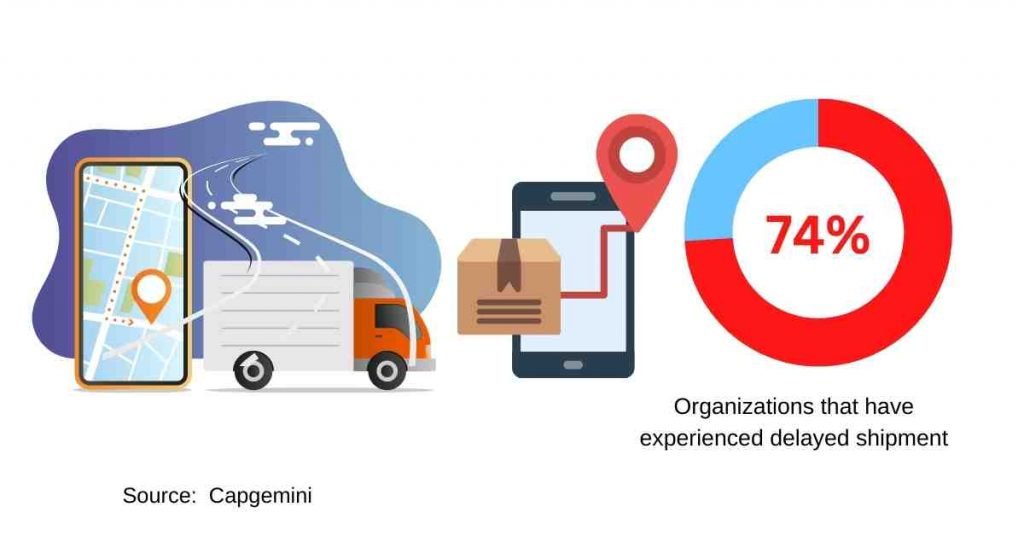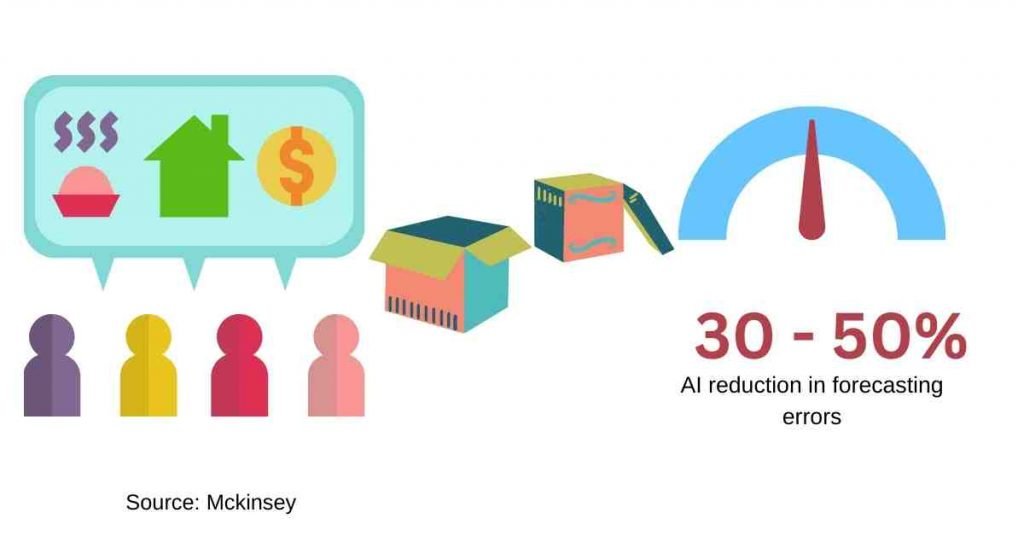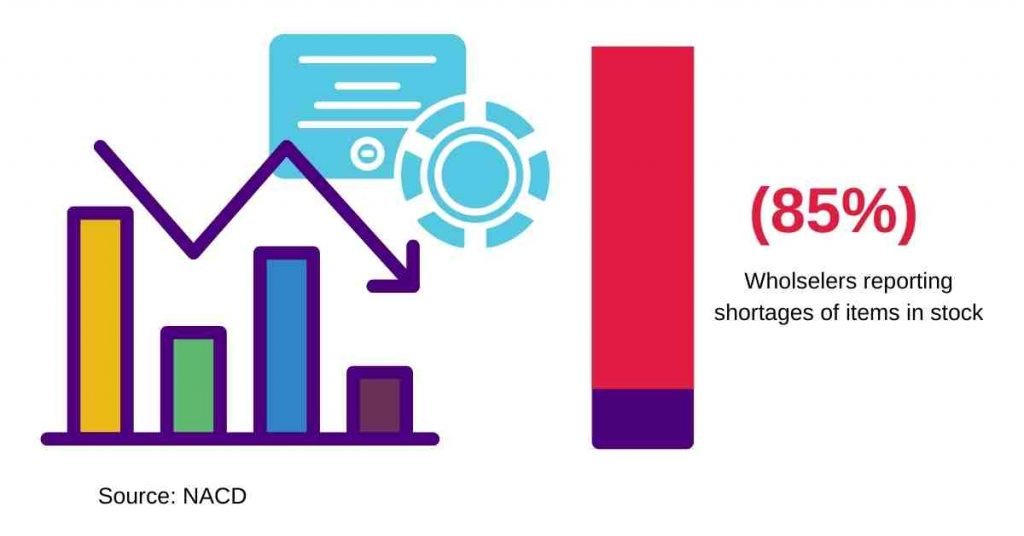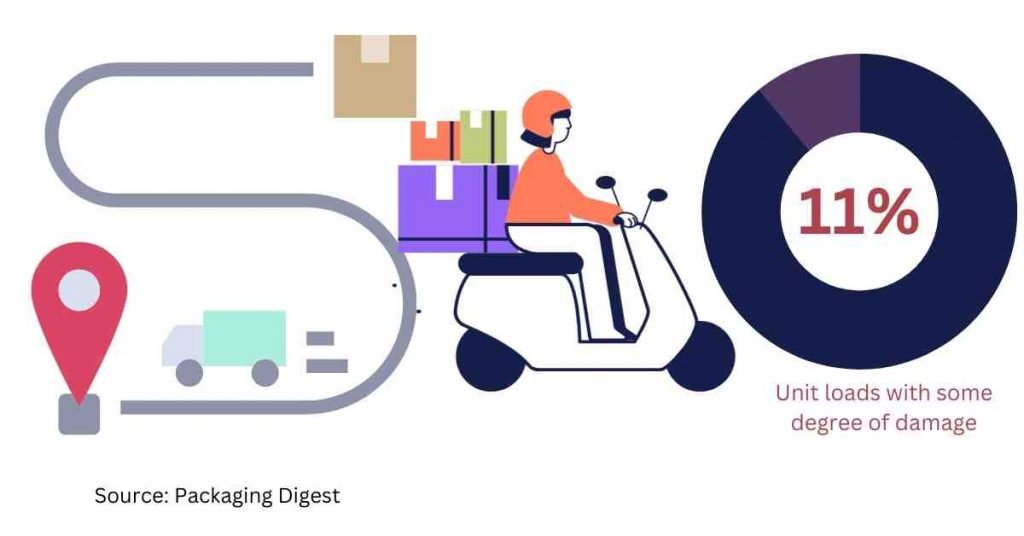Supply chain management is one of the most important aspects of business.
As businesses seek to remain competitive in an increasingly globalized and data-driven economy, many are turning to AI and machine learning to streamline their operations.
What’s the impact of AI on supply chain management?
As it turns out, AI is already having a major impact on supply chain management and the trend is only expected to continue. In fact, according to a study by PWC, AI is expected to add $15.7 trillion to the global economy by 2030.
It’s no secret that applications of artificial intelligence in supply chain management are drastically changing the business landscape as we know it.
AI-enhanced solutions can increase efficiency in your supply chain and help you find better, safer ways to move goods from one location to another.
In this article, we will cover 5 interesting applications of artificial intelligence in supply chain management.
Let’s begin.
1. Route Optimization
Transportation is one of the most important aspects of supply chain management.
Many businesses face numerous transportation issues, most of which lead to delays, which could lead to poor customer service and client complaints. It is also difficult to manage numerous routes during heavy traffic. The increase in demand is to blame for many of these challenges.
According to a report by Capgemini, 74% of organizations have experienced longer lead times and delayed shipments.
Manual processes degrade the accuracy, scalability, flexibility, and efficiency of your supply chain.
Businesses are struggling to find new ways to be more efficient in logistics and meet customer expectations. Customers have higher expectations for communication and service including real-time notifications and precise delivery estimates.

AI can also be used to manage your fleets of vehicles, keeping track of maintenance schedules, fuel consumption, and driver behavior.
This information can be used to improve efficiency and reduce costs.
AI can help to optimize routes for transportation networks, taking into account factors such as traffic, weather, and construction. This can help you to save time and money by reducing travel time and fuel consumption.
We can also leverage AI to monitor traffic patterns and congestion, and provide an optimized transportation network.
A well-known dairy business in the Middle East encountered difficulties moving its products across its 500 sales routes. They partnered with FlatWorld Systems which used machine learning algorithms to map areas and improve the delivery plan considering the changing customer requirements.
As a result, they were able to cut their trip distance by 27% and their route length by 16%. Additionally, it produced considerable savings.
2. Demand Forecasting
An important part of effective supply chain management is demand forecasting.
Businesses are struggling to accurately predict future demand for their products and services. This has resulted in stock outs, excess inventory and poor production with customer needs.
Your demand estimates must be accurate since errors in forecasting might result in a variety of other supply chain issues.
According to a report by Mckinsey, AI-powered forecasting can reduce forecasting errors by 30 to 50% in supply chain networks.
Businesses can identify opportunities for cost savings and other process improvements through demand forecasting.
Demand forecasting is one of the applications of artificial intelligence in supply chain management.

By analyzing past patterns and trends, AI can provide accurate predictions of future demand. This helps businesses to better manage their inventory and production, and avoid stock outs or excess inventory.
AI is increasingly being used in demand forecasting in supply chains.
In fact, the artificial intelligence software business will be valued $62 billion by 2022, according to a recent report by Garner.
AI can also help to identify potential disruptions in the supply chain and suggest solutions. Ultimately, AI can help businesses to optimize their supply chains and improve efficiency and profitability.
A leader in the marketing and distribution of food items found it difficult to predict future demand using historical data. They collaborated with Accenture by leveraging AI to improve demand sensing.
They found that by reducing forecast mistakes by 6–8 points, they could potentially gain $100–130M in benefits from inventory, cost savings, and additional income.
3. Stock Replenishment
One of the most important aspects of any business is keeping accurate records of inventory and knowing when to reorder stock.
This can be a time consuming and difficult task, especially for businesses with large inventories and those that work with traditional systems.
Too little products and you’ll run out of stock, too much and you’ll be stuck with excess inventory.
In a survey by NACD, in the chemical industry, 85% of wholesalers reported shortages of items in stock.
Having a good understanding of your customer demand is always a challenge. Therefore stocking the right items in the right quantities is always close to impossible. All these reduce efficiency in your replenishment process.

However, applications of artificial intelligence in supply chain management can help with this process, to keep track of stock levels and replenish stock when necessary. This can be a huge time saver for your businesses, as well as helping you to ensure that you never run out of stock of any items.
It can also help to reduce the amount of money that is tied up in your inventory, as stock can be replenished as soon as it is sold.
A producer of more than 70 specialty beverages was having stockout problems that was costing millions of dollars in missed sales.
To achieve an end-to-end automation powered by cutting-edge AI algorithms, they teamed up with Qentelli. They saw a 20% decrease in understocking and overstocking incidents, which equates to a 5%–10% increase in fill rates per month.
4. Automated Packaging
What is the role of AI in supply chain packaging?
In the world of supply chain management, packaging plays a critical role in ensuring that products arrive safely and securely at their destination.
But packaging can also pose challenges, particularly when it comes to managing your inventory and transportation costs.
For businesses, it’s important to strike a balance between protecting products and minimizing packaging costs. This can be a challenge, as the needs of each supply chain are unique.
According to Packaging Digest, up to 11% of unit loads that arrive at distribution centers have some degree of case damage.
Automated packaging is another area of applications of artificial intelligence in supply chain management. AI packaging systems use artificial intelligence to optimize the packaging process in supply chain processes.
You can increase productivity and accuracy while cutting costs through AI-powered automation.

Packaging equipment with AI capabilities can recognize and track your products, optimize packaging designs, and even make packaging suggestions.
AI automated packaging can help your business to save time by automating the process of packing and shipping products to your clients. Automation also reduces the risk of errors and damages to your products during shipping.
Omoda, a shoe retailer in the Netherlands, frequently sent up to 50% air in shoe packages which affected both sustainability and consumer pleasure.
They leveraged Ranpak’s Cut’it EVO, an automated solution that reduces packaging waste. As a result they realized a 46% decrease in the amount of air shipped, saving 25% of truck space and improved customer experience.
5. Customer Experience
Supply chain is finished when the product has been delivered to the customer.
One of the most important aspects of supply chain management is customer service. Businesses are struggling to resolve customer issues and complaints in a timely and efficient manner.
You need to have a clear view of your customers’ wants and needs, in order to provide good customer service in your supply chain process.
This includes providing customer support, handling customer complaints, and ensuring that customer expectations like delivery and tracking of goods are met.
According to a survey by Salesforce, 66% of the surveyed clients anticipate that businesses will comprehend their wants.
How can AI in the supply chain enhance customer experience?
Customer experience is one of the applications of artificial intelligence in supply chain management.

AI-powered applications and communication devices are being used in supply chain workflow to engage consumers.
AI tracking systems are able to provide real-time visibility into the location and status of inventory in transit enabling you to meet your customer expectations by improved interaction and transparency.
By accurately predicting your customer demands using AI and planning your production and inventory, your users will be able to access the items when required.
A logistics facility in Southern Ontario received numerous complaints from partners about their failure to enhance customer service in logistics by delivering all goods at the appropriate time.
The company sought an AI tracking solution from Synlabs to enhance their logistics operations. In addition to reducing customer complaints in an unprecedented way, they also realized improved delivery at the correct time.
Conclusion
In conclusion, it is evident that applications of artificial intelligence in supply chain management are playing a pivotal role in various processes.
We looked at 5 interesting applications of artificial intelligence in supply chain management. From stock replenishment to transportation route optimization and customer service, AI has changed the game by increasing efficiency and accuracy while reducing costs in the supply chain.
The potential benefits are vast and it is safe to say that AI will continue to revolutionize the supply chain industry.
It is therefore important for you to consider implementing AI to streamline your supply chain management and make it more efficient.

![5 Innovative Applications of Artificial Intelligence in Manufacturing [2021]](https://geokongo.com/wp-content/uploads/2021/09/Applications-of-Artificial-Intelligence-in-Manufacturing-2021-1024x536.jpg)


